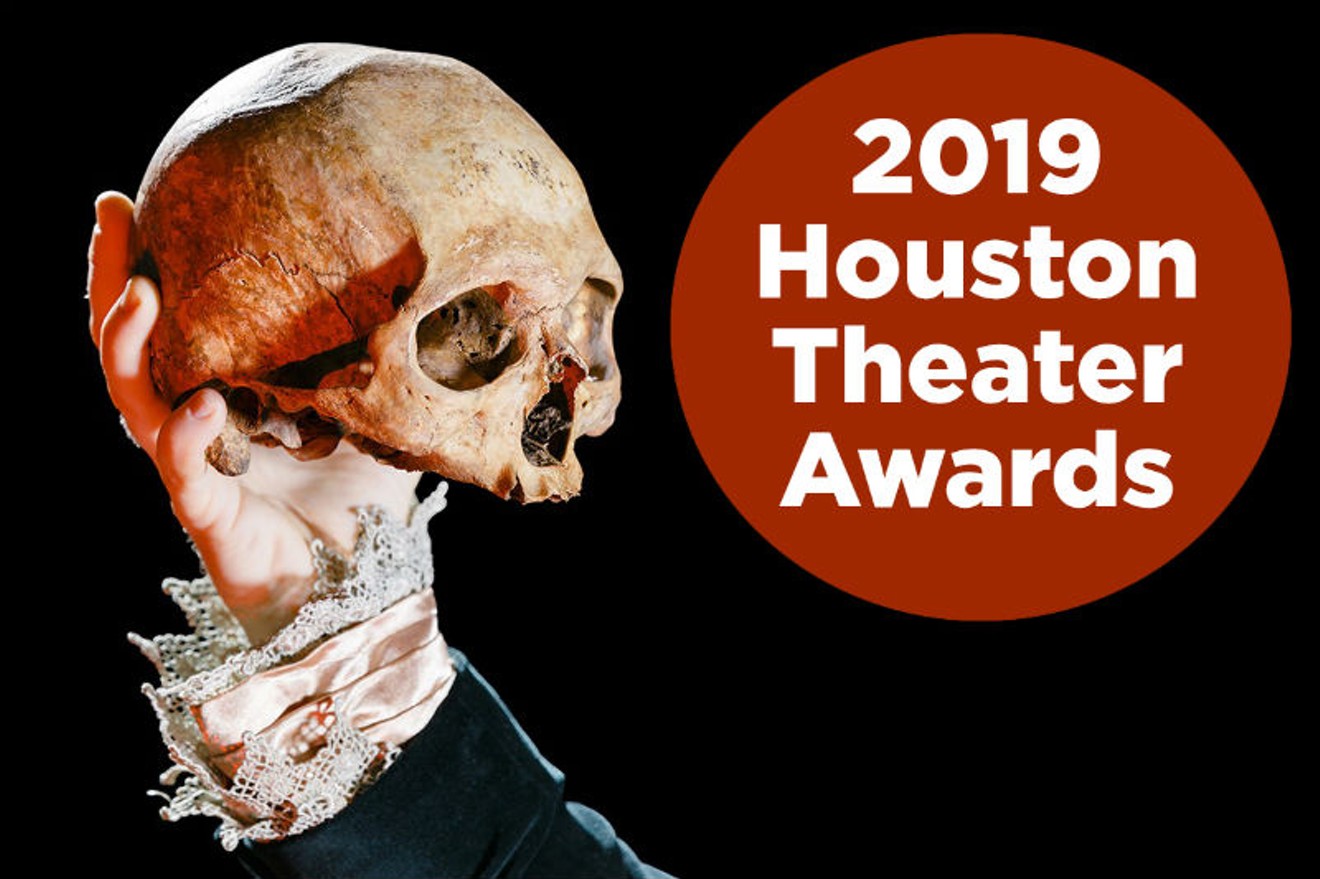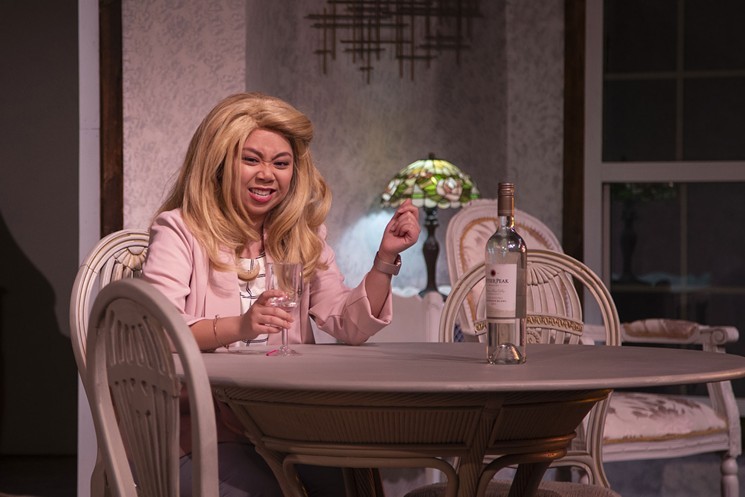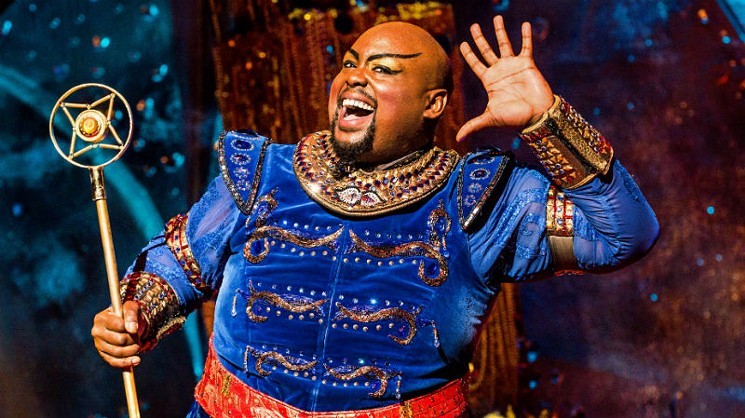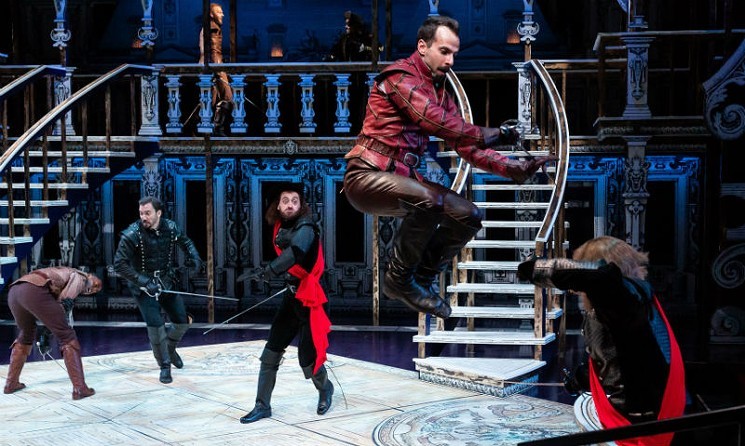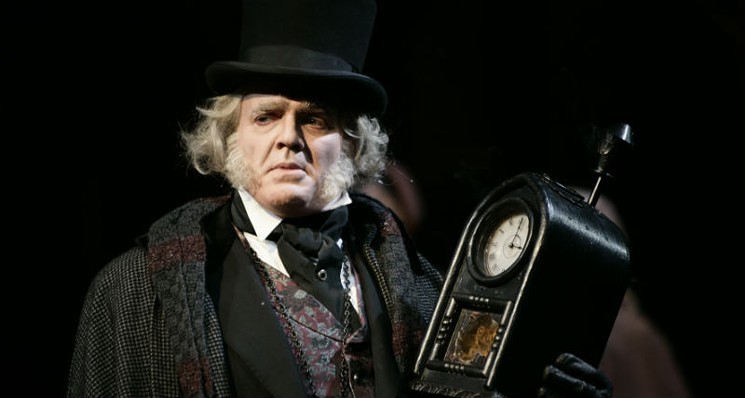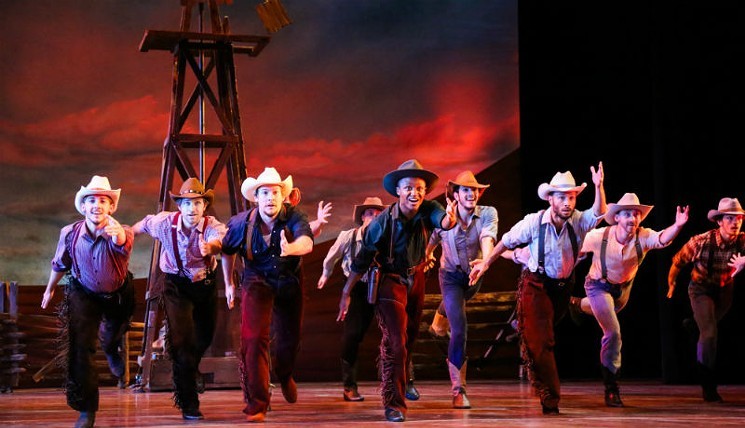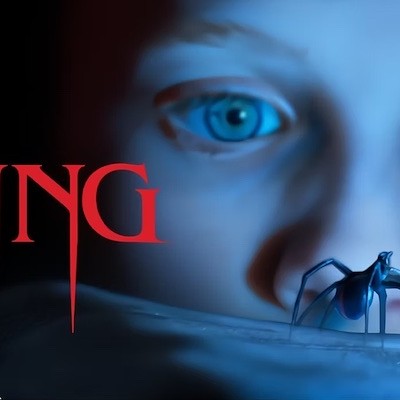When our distinguished panel met to finalize our winners and nominees for the 2018-19 Houston Theater Awards, the meeting was surprisingly amicable. Many of our choices were unanimous, or close to it, which I think speaks highly of the quality of this year's winners. It was, by all accounts, a hugely successful season, filled with intriguing productions, superb performances, and crafty theatricality.
We went to prison in Jesus Hopped the "A" Train (4th Wall), we spent the holidays with Jane Austen in Christmas at Pemberley (Main Street) and Pride and Prejudice (4th Wall). We traveled to outer space via Panto Star Force (Stages) and traveled into interpersonal space in Constellations (Alley). We heard ghost tales in an Irish bar in The Weir (Main Street) and went to see the freaks in Side Show (Queensbury).
We witnessed the musical founding of our 46th state in Oklahoma (TUTS) and then went to the movies in The Flick (Horse Head). We bonded with family in The Humans (Alley) and got friendly with pirates in The Fair Maid of the West (Classical). While the Sin Muros festival (Stages) highlighted simpatico, The Secretary (Main Street) highlighted gun rights. We took boxing lessons in The Royale (Rec Room) and learned how to crack an egg like a head in Macbeth Muet (Main Street/La Fille Du Laitier).
We spent Tuesdays with Morrie (A.D. Players) then went Around the World in 80 Days at the same theater. We were subjected to medical experiments in The Effect (Houston Equity Festival) and played doctor with Quack (Alley). We swashbuckled with The Three Musketeers (Alley) and learned forgiveness in Les Misérables (Broadway at the Hobby).
We seemed to go everywhere within imagination last season. It was quite a trip. Thank you all, winners and nominees alike, who led us on these fantastic voyages. You've given us memories for a lifetime. — D.L. Groover
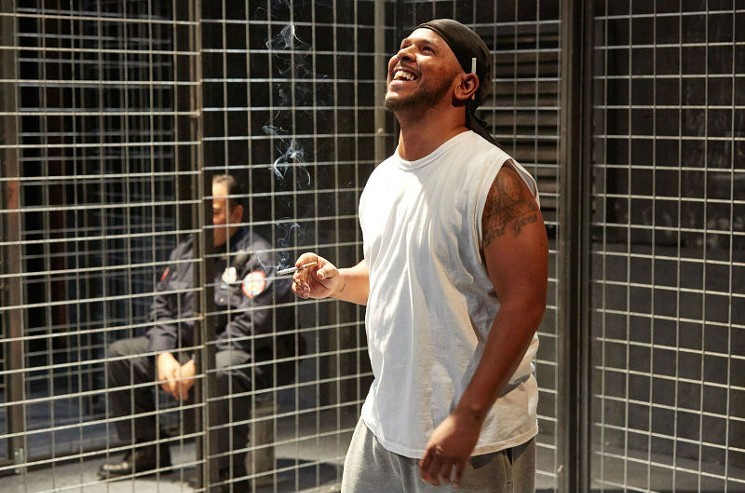
Joseph "Joe P" Palmore in his hypnotic portrayal of a vicious serial killer in Jesus Hopped the "A" Train at 4th Wall Theatre Company.
Photo by Gabriella Nissen
Jesus Hopped the "A" Train (4th Wall Theatre Company)
Stephen Adly Guirgis' Jesus Hopped the "A" Train lays bare the justice and injustice of our legal system in its stark examination of the intersecting lives of two inmates: a serial killer rightfully behind bars who without question murdered people and his yard mate at Rikers, a young man who in a stupid, non-intentional way ends up charged with murder.
Serial killer Lucius, in a bravura performance by Joseph "Joe P" Palmore, admits he's killed people and expresses no remorse about doing so, but says he has found God and been forgiven. Angel, played by Mateo Mpinduzi-Mott, is a lost soul. Trying to get a friend away from a religious sect, he shoots the cult leader in the butt. Unfortunately, while being operated upon to remove the bullet, the cult leader dies on the table and the charges against Angel are upgraded to murder. Left dazed by events, Angel becomes easy prey for the other inmates, and struggles to find a way to pray to the God who he believes has gone missing in his life.
Santry Rush plays the sadistic guard Valdez, Orlando Arriaga the nicer guard D'Amico and Christy Watkins the public defender Mary Jane who represents Angel, but not well. All are brought together in compelling tension by director Kim Tobin-Lehl. Whether audience members have been in jail or not — the slip-sliding slope of Angel's life, the mental health help that Lucius probably needed and never received growing up and the other players overwhelmed by the criminal justice system — these are all characters audience members can identify with, Tobin-Lehl said last year.
Staged in the intimate setting of Studio 101 and aided by Ryan McGettigan's movable mesh cages and the appropriately harsh overhead lighting by Christina Giannelli, Jesus Hopped the "A" Train was a compelling, thought-provoking and absorbing night of theater, carried out by a company of performers, director and designers at the top of their game.
Finalists: The Flick (Horse Head Theatre Company), The Humans (Alley Theatre), The Hunchback of Seville (Mildred's Umbrella Theater Company) and The Fair Maid of the West (Classical Theatre Company).
Best Musical
Ragtime (Theatre Under The Stars)
For a quintessentially American musical that's more relevant today than at its premiere (1996), Ragtime, with
music and lyrics by Stephen Flaherty and Lynn Ahrens, and book by Terrence McNally, is serious. It has grand ideas, epic sweep, operatic production, and cinematic flow. Buoyed by a rich score, intelligent lyrics, and polished book, American history turns personal and deeply moving.
The musical was adapted from E.L. Doctorow's 1975 kaleidoscopic historical novel that featured cameos from industrial tycoon J.P. Morgan, master illusionist Harry Houdini, patron saint Booker T. Washington, explorer Admiral Perry, scandalous Evelyn Nesbit, and anarchist Emma Goldman. These real figures swirl in and out of the lives of three disparate families – the nameless white upper-crust Father and Mother, the rising black musician Coalhouse Walker, and the Jewish immigrant Tateh and young daughter.
Their lives intertwine with explosive force, but meld together under the powerful new music that's sweeping away the vestiges of the Gilded Age. Big and sprawling, the show, in a way, is our American Les Miz. The times are changing, and music changes with it. Music, perhaps, changes the times. Those unable or unwilling to adapt are swept into the past. Not surprisingly, the social problems at the beginning of Ragtime's 20th century eerily parallel those at the beginning of our 21st – there is still toxic masculinity, economic imbalance, radical politics, bigotry, class division, gender inequality.
Minimal yet efficient, the show via Theatre Under The Stars had class and looked gorgeous. Kevin Loney's haunting watercolor projections evoked and stimulated, dissolved in and out like a movie. Against these, Kevin Depinet's elemental furnishings, like stairs and door frames, were entirely of a piece. Santo Loquasto's stunning period costumes came from the Kennedy Center revival, while Matthew Richards's lighting overlaid this musical history journey with blazing theatrical dash and excitement.
The pace and movement were wondrous, with the credit going to director Marcia Milgrom Dodge, also from the Kennedy Center production, who doubled as choreographer. The blending of movement and dance was seamless, a bit of cakewalk on the side to get people out of the way for the next scene. Not for nothing was the front curtain a portrait of the face of the Statue of Liberty, with the proscenium ringed with Emma Lazarus's last lines from The New Colossus: “Give me Your Tired, Your Poor....” Ragtime is the face of America, with its flaws and blemishes, its ideals quashed or radiantly realized, its beauties and disappointments. Anyone with a dream is welcomed. Where else on earth can you dream so large? Even if you fail, dreaming in syncopated ragtime is always better. TUTS dreamed big.
Finalists: Jerome Robbins’ Broadway (Theatre Under The Stars), Oklahoma! (Theatre Under The Stars), Side Show (Queensbury Theatre) and The Wiz (Theatre Under The Stars).
Best Actor
Joseph "Joe “P” Palmore as Lucius in Jesus Hopped the "A" Train (4th Wall Theatre Company)
Lucius, as portrayed by Joseph "Joe P" Palmore in Jesus Hopped the "A" Train, was an improbable martyr. The man is a convicted serial killer without remorse for what he has done. His are not the commonly heard pleas of "I am innocent." Instead, in a beautifully nuanced performance, Lucius accepts responsibility for his actions and announces he has found Jesus and been forgiven. Stuck in Rikers Island correctional facility, awaiting extradition to Florida and sure execution there, Lucius preaches his particular version of gospel to yard mate Angel (Mateo Mpinduzi-Mott). Should Angel believe him? Should the audience?
In a Houston Press interview about his role last year, Palmore said he was more accustomed to being cast as a young, good person. This time around, he said, he wanted the part of the captive felon drawn in by the question of whether a man like him could be saved. "It forces people to really think about their idea of Christianity and what the Bible says," he said. As it turned out, he perfectly inhabited the role in an electric performance. His energy was palpable during the push-ups and jumping jacks and no less in evidence when he sat, paced, waited.
Despite being "saved," Lucius was no saint as he awaited transfer. He taunted a sadistic guard, and bullied a helpful one into breaking the rules and bringing him snacks and cigarettes from the outside world. Growing up, he probably had undiagnosed, untreated mental illnesses, but he made no excuses for what he became. Palmore ate up the caged space in a performance both believable and heartbreaking. His Lucius was someone you probably wouldn't want to meet but, having done so, can never forget.
Finalists: Luis Galindo as Weston in Curse of the Starving Class (The Catastrophic Theatre), Chris Hutchison as Dr. Irving Baer in Quack (Alley Theatre), Ian James as Ethan Kane in Sex With Strangers (Stages Repertory Theatre), Antonio Lasanta as Avery in The Flick (Horse Head Theatre Company) and Brandon Morgan as Jack in The Royale (Rec Room Arts).
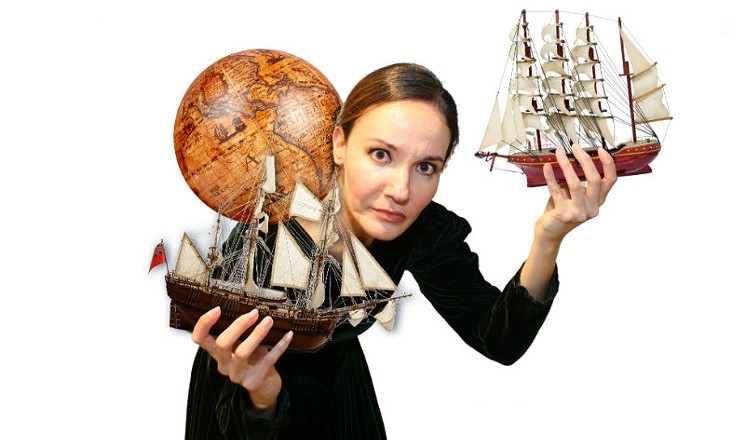
Patricia Duran as Maxima Terrible Segunda in The Hunchback of Seville with Mildred's Umbrella Theater Company
Photo by Gentle Bear Photography
Patricia Duran as Maxima Terrible Segunda in The Hunchback of Seville (Mildred’s Umbrella Theater Company)
In those moments of clarity and that punch of luck that only theater can deliver, roles of a lifetime arrive when least expected or even asked for. Patricia Duran was blessed by the gods when director Philip Hays chose her for the role of Maxima Terrible Segunda in Charise Castro Smith's comic pseudo-historical The Hunchback of Seville.
A force of grace and exquisite ability over many seasons on our Bayou stages, Duran operated at full steam no matter the character, investing each with enviable facility, unbridled passion, and well-deep intelligence. She didn't shy from the klieg light, she brought her own.
As the deformed half-sister of the formidable Queen Isabella of Spain (a radiantly haughty Elizabeth Marshall Black), Maxima was kept virtual prisoner in the castle's tower, out of sight of the world. Ugly and misshapen, being seen would tarnish the gleam of the Spanish crown. Age had worn her down, but she was smart and curious, so unlike the pampered and self-deluded courtiers. (Her chambers were hung with maps of the world, known and unknown.) She was the most clever among them, but her morality and sense of justice went unappreciated, usually unnoticed.
Maxima was Smith's conscience, witty and wise beyond her Renaissance era, and Duran overlaid her external frailty with both grand heart and tart tongue. She spoke to us with compassion, abiding spirit, and deep waters. She was a high-def character surrounded by cartoons, the most humane and most human. Shaded like an El Greco altarpiece, Duran's multi-faceted performance was the heart of the play, warm and beating and full of empathy. Mildred Umbrella's impeccable production was a small gem. Crafty Duran polished it like Harry Winston.
Finalists: Amy Bruce as Woman in On The Exhale (Rec Room), Elizabeth Bunch as Aimee in The Humans (Alley Theatre), Courtney Lomelo as Ella in Curse of the Starving Class (The Catastrophic Theatre) and Teresa Zimmermann as Violet Hilton in Side Show (Queensbury Theatre).
Best Supporting Actor
Jayden Key as Wesley in Curse of the Starving Class (The Catastrophic Theatre)
Last October, in a lovely piece of theater archaeology, The Catastrophic Theatre unearthed Sam Shepard's Curse of the Starving Class, and also unearthed actor Jayden Key, whose incandescent performance as young son Wesley was so mesmerizing we had to honor it. Shepard's drama, lean and crisp as a dry cornstalk, ignited the stage with a canny blend of surrealism, kitchen sink, and a poet's voice that spoke to broken family and home. Curse explored and exploded a particular elegy to the American dream. A lost dream set in the lost west. His wonderfully weird tale – part nightmare, part reverie – hauntingly pitted family against itself, and family against the facelsss unknown out there beyond the front door. Like Shepard's ancient Greek progenitors, kin eat each other alive. Father against son, brother against brother. It's a male world Shepard dissects. His wild west, or what's left of it, is strictly a guy thing.
The Tate family was a mess. So was their farm. Son Wesley (Jayden Key) would have been content if only someone would pay him attention. Like a family out of low-rent Chekhov, everyone longed to escape.
As he slowly morphed into the father he loathes, Key, as Wesley, stuffed his face with a cucumber dipped in mayonnaise, then gorged on anything he could find in the fridge, a bulimic's nightmare. In a scene as audacious as anything seen on stage this past season, Key maniacally devoured while unburdening his tortured soul. He made anguish physical. In the play's most stirring and shattering moment, Wesley, naked, carried his sick lamb across the kitchen and out to be slaughtered. Bathed in J. Mitchell Cronin's iconic lighting, it was a vision ripped from Genesis. You couldn't miss the obvious, for it was a powerful theatrical image, yet Key radiated his own special light. He wanted to save the family farm, but his catharsis was swathed in irony: he became his father, wearing Weston's old clothes, never able to escape the past. The Tates were cursed, their dreams destroyed. But fortunately, we also got to experience the incredible work of this amazingly fine young actor.
Finalists: Domonique L. Champion as the Reverend Benson and others in Bootycandy (The Catastrophic Theatre), John Feltch as Ben Johnson in The Book of Will (Main Street Theater), Philip Hays as Mary in Pride and Prejudice (4th Wall Theatre Company), George Knapp as Kent in Talk Radio (Dirt Dogs Theatre Co.), David Matranga as Aiden in NSFW (Stages Repertory Theatre).
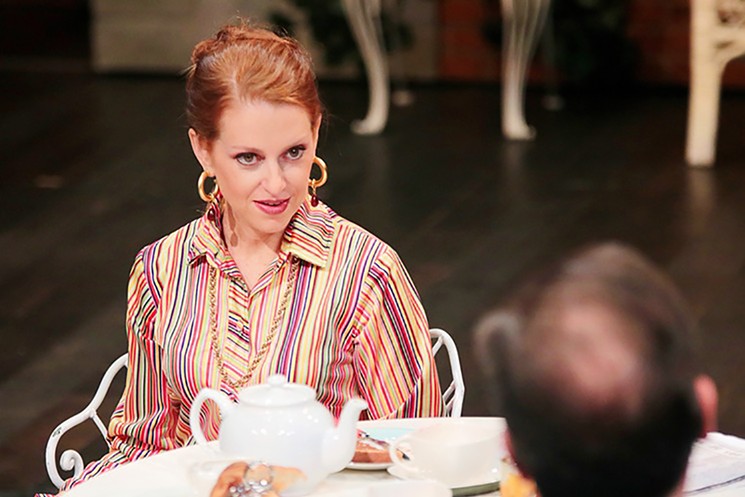
Kara Greenberg as Sheila in Main Street Theater's Relatively Speaking
Photo by Pin Lim/Forest Photography
Best Supporting Actress
Kara Greenberg as Sheila in Relatively Speaking (Main Street Theater)
It's often difficult to explain to someone who hasn't seen it why a particular performance sticks in your mind, why a role that would have been good enough, competent or routine was instead transformed into something really stellar. Such was the case in Kara Greenberg's turn as Sheila in Main Street Theater's production of
Alan Ayckbourn's Relatively Speaking.
The play itself, set in the 1960s, was a farce of enormous proportions with the usual carefully timed "just missed you" entrances and exits and a vague manner of speaking with a lot of "he", "she" and "they"s instead of specific names that led to comic confusion and misunderstanding. Main Street Theater played this for all it was worth as Ginny (Lindsay Ehrhardt) decided after a proposal from roommate Greg (Blake Weir) that she should finally break things off with her married lover Philip (Tom Prior) — a relationship that neither Greg nor Philip's wife Sheila knew about.
Ginny headed to Philip's to tell him all bets were off. She told Greg that she was going to visit her parents and although he wanted to come with her, she insisted it was not the right time. Greg figured out the address she was going to and showed up as a surprise, getting there even earlier than Ginny (thanks to her delayed train) where he engaged with an increasingly befuddled Sheila and Philip, thinking they were his fiancée's parents.
It was in the Sheila character played by Greenberg that Private Lives found its heart and soul. All eyes repeatedly returned to Greenberg throughout the play and, when she wasn't on stage, she was missed. Ginny was a liar and a manipulator, Philip was a cad who cheated on his wife and was ready to blackmail his girlfriend into staying with him. Greg was just, well, too gullible. But Sheila as played by Greenberg was fascinating as a woman in a strained marriage, who was a little on the ditzy side but not a fool and who came through like a trouper once she sorted things out.
It was a role that could have been a stereotypical mess, but Greenberg's deft handling of her lines produced a character both memorable and mesmerizing. And probably the only one of the group you'd like to know in real life.
Finalists: Lindsay Ehrhardt as Clem in The Fair Maid of the West (Classical Theatre Company), Regina Hearne as Mama Carrie in Josephine Tonight (The Ensemble Theatre), Heidi Hinkel as Valerie in The Weir (Main Street Theater), Briana J. Resa as Infanta Juana in The Hunchback of Seville (Mildred's Umbrella Theater Company) and Bree Welch as Lorrie in The Secretary (Main Street Theater).
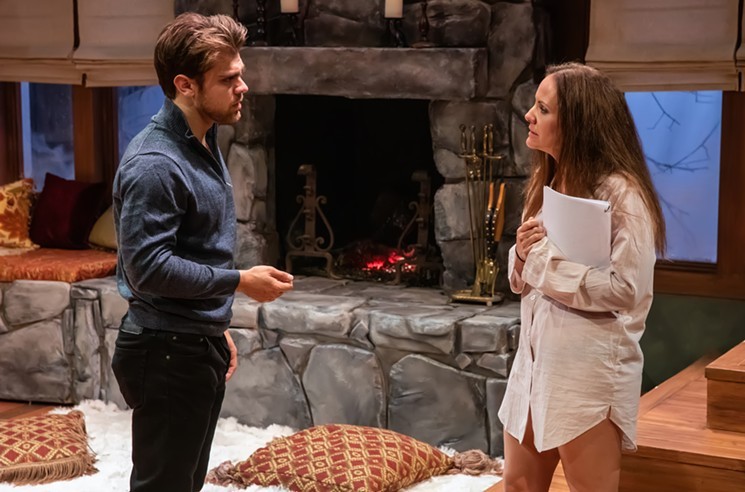
Ian James and Elaine Robinson in Stages Repertory Theatre’s production of Sex with Strangers.
Photo by Amitava Sarkar
Ian James as Ethan Kane in Sex With Strangers (Stages Repertory Theatre)
Millennials are an easy target, and in Laura Eason’s Sex With Strangers, Ethan Kane epitomized everything the Boomers like to believe and ridicule about them. He was arrogant, entitled and narcissistic, perpetually plugged in and a chronic digital oversharer who had made a fortune off a book series (based on a blog) about his quest to have sex with a different woman every week for a year. But underneath that misogynistic dude-bro bravado was someone else, someone who was as charming and funny as he was keenly self-aware and thoughtful. Someone who was driven by a desire to be respected and taken seriously, and completely different from his bad-behaving nom de plume.
Or was he?
It was the deft handling of these dual identities, the tightrope walk that defines a generation, that led us to name Ian James this year’s Best Breakthrough. James was simply irresistible, not just to co-star Elaine Robinson’s Olivia (though electricity just crackles between the two), but to the entire audience, which is why when the line between public and private begins to blur, we’re asking as desperately as Olivia: “How can I trust who you are right now?” Though we may have wanted the real Ethan Kane to please stand up, James offered something even better: a timely, nuanced peek into a self-imposed box, walls constructed over the course of a lifetime crafting and curating yourself for public consumption.
Finalists: Domonique L. Champion as Actor 4, Reverend Benson, Writer 3, Stepfather, Larry and Old Granny in Bootycandy (The Catastrophic Theatre), Tanner Ellis as Omari in Pipeline (The Ensemble Theatre) and Antonio Lasanta as Avery in The Flick (Horse Head Theatre Company).
Best Choreography
Stanton Welch for Oklahoma! (Theatre Under The Stars)
They say when life hands you lemons, make lemonade. Though cliché, it’s exactly what happened one week after Hurricane Harvey, when Theatre Under The Stars’ new Artistic Director Dan Knechtges – in just his first week on the job – found himself in a room full of shell-shocked Theater District bigwigs, one of whom was Stanton Welch.
Smash cut to one year later. It was the opening night of Oklahoma!, and not only was it a celebration of Theatre Under The Stars’ 50th anniversary season, it marked the first collaboration between the Welch-led Houston Ballet and TUTS, born out of that disaster-caused meeting. Like the cowboys and the farmers of Oklahoma!, the theater nerds and the ballet dancers of Houston came together with the same communal spirit and contagious optimism that permeates the Rodgers and Hammerstein classic.
Welch put his choreographic storytelling skills to work, building on Agnes de Mille’s original choreography, both paying homage and dragging it – on pointe – into the 21st century. Along with him, he brought 21 artists of the Houston Ballet, six alternating the musical’s three Dream roles and the rest integrated into the ensemble.
Not only did Welch seamlessly meld classical ballet vocabulary with cowboy waltzes and two-steps to create infectiously peppy, lively dance sections, he brilliantly wove movement throughout the production to lend a more complex psychological picture to the characters. And nowhere was it more apparent than in Welch’s layered take on the musical’s usual boogeyman, Jud, and the show-stopping “Out of My Dreams – Ballet,” where Laurey’s subconscious took a dark, nightmarish turn.
Now that our collective appetite’s been whet, we can only hope that the opportunity for collaboration comes around again, and sooner rather than later. No pressure though.
Finalists: Brian Jucha for Toast (The Catastrophic Theatre), Marcia Milgrom Dodge for Ragtime (Theatre Under The Stars) and Bethany White for Side Show (Queensbury Theatre).
Best Costumes
Kristin Knipp for Elf The Musical (Queensbury Theatre) and Side Show (Queensbury Theatre)
Okay, let’s talk about range, because this year you could find Costume Designer Kristin Knipp’s work on display in two very different Queensbury productions. One transported us to a snowy, candy cane-framed North Pole and the other, to a stop along a Depression-era side show circuit. But in both, Knipp made a case to take home this award that we just couldn’t refute.
In Elf The Musical, Knipp outfitted Marco Camacho's lovable Buddy in an immediately recognizable green belted tunic, yellow tights, pointed hat and curled toe genie slippers, but it was her work on the supporting cast and ensemble where she really shined. Knipp dressed New York City with style and class, and the North Pole, with bold and bright colors, filling the stage with holiday cheer and, of course, Santa suits. Lots of Santa suits.
Where one show was filled to the brim with Santa’s helpers, the other required a bearded lady, a human pin cushion, a lizard man, a dog boy and, of course, Daisy and Violet Hilton, the conjoined twins at the center of Side Show. For Knipp, the order was anything but tall, as she populated the fairgrounds, and the seedy world of exploitation to be found there, with unique designs and period standards, including recognizable straw hats and pinstripes, lace and slinky dresses. So this year, whether you wanted to sneak into Santa’s workshop or the call of a banner loudly advertising “freaks” was too hard to refuse, Knipp knew exactly what you needed to wear.
Finalists: Dede Ayite for The Wiz (Theatre Under The Stars), Macy Lyne for Bootycandy (The Catastrophic Theatre), Leah Smith for The Hunchback of Seville (Mildred's Umbrella Theater Company) and Paige Wilson for Pride and Prejudice (4th Wall Theatre Company).
Best Cabaret
We're Gonna Die (Horse Head Theatre Company)
It’s one thing to set universal anxieties around getting older, being alone, and our own mortality to a beat. It’s another to get an audience to gladly clap and sing along. But that’s exactly what Horse Head Theater Company did when they staged Young Jean Lee’s surprisingly life-affirming cabaret, We’re Gonna Die. Directed by Jacey Little, and starring the shimmery Alli Villines and her never-leave-home-without-them ukuleles, We’re Gonna Die was a communal existential crisis – the key word there being communal.
Backed by bassist Alan Simmons and percussionist Gitiim Chakamoi, Villines (who doubled as musical director) artfully strummed her ukulele and lent her beautifully sweet voice to all the things we tend to keep locked up inside, which (in turn) keep us up at night – remembering mean girls in the schoolyard, finding your first gray hair, brutal breakups, sheer loneliness. And then, with throw-up-your-hands resignation, asked questions like, “Who do you think you are to be immune from tragedy?” But instead of an assault, it was a much appreciated comfort. We’re Gonna Die was catharsis, plain and simple.
Horse Head took the show on the road, bringing Lee’s unique brand of upbeat morbidity to Houstonians in and out of the loop last August before reviving it one more time in February for a wake. The deceased? Horse Head itself. The one-night-only encore performance was apt, a little more comfort to be had as Villines sang things like, “I’ll be gone and it’ll be okay,” and one last chance to thank Horse Head for the opportunity, as fleeting as it was, to feel a little less alone.
Best Sound
Jon Lachlan Stewart for Macbeth Muet (La Fille Du Laitier/Main Street Theater)
Francophiles, don’t let the title fool you. Yes, a production with the word “mute” in the title (albeit in French) can win an award for sound design. Macbeth Muet, with original sound design by Jon Lachlan Stewart (and engineered by Jacob Sanchez for Montreal-based theater company La Fille Du Laitier’s stop at Main Street Theater), may be without spoken words, but the soundscape was anything but silent.
Stewart’s sound design became a character in and of itself, creatively propelling the actors forward (literally, Macbeth Muet was a precision operation), setting the pace and driving the story. From the ding of a bell that indicated scene changes to the effects of a chillingly sharp, wet crack of an egg, Stewart found new and inventive ways to expand on the ideas of radio plays and traditional silent films for the production, particularly in the use of music.
From the Andrews Sisters to Duran Duran and seemingly everything in between, Stewart repurposed a library of familiar tunes to great, and sometimes unexpected, effect. Seriously, it’s pretty meaningful when a song like "The Sound of Silence", so heavily associated with a certain film, can so easily be used to such visceral effect in a completely different context. A much more deadly context, at that.
Finalists: Jon Harvey and John Peeples for The Hunchback of Seville (Mildred's Umbrella Theater Company) and Matt Starritt for The Humans (Alley Theatre).
Best Set Design
Ryan McGettigan for Curse of the Starving Class (The Catastrophic Theatre), Jesus Hopped the "A" Train (4th Wall Theatre Company), Elf The Musical (Queensbury Theatre), Violet (Queensbury Theatre) and Pride and Prejudice (4th Wall Theatre Company)
Master designer Ryan McGettigan was a very busy man last season, designing the fragrant atmosphere for six wildly different plays and musicals. It's not just the amount of great work he accomplished, but the depth of feeling he designed into each.
There was no such thing as a random look to a McGettigan production; each set fitted the play as if it were definitive to it. He tailored and brought sense to it, overlaid it with a palpable life of its own; he gave it breath. We could taste it. There was that dilapidated farmhouse kitchen in Curse of the Starving Class with its soiled refrigerator and scuffed linoleum that hadn't seen a mop for years with cornstalks shriveling in the backyard. We felt the stifling heat of a New York summer in a brutal prison yard in Jesus Hopped the "A" Train, with its clanging doors and steel mesh cages.
Musical Elf sang in a Necco wafer world of vivid brights and Christmas joy that made us smile like kids. The more nuanced Violet, depicting a young girl's journey for salvation on a bus trip through the '60s South, was evoked with rustic wood planking and torn newspapers. Jane Austen's cozy Regency England literally surrounded you in Pride and Prejudice, a mad cabinet of curiosities, geegaws, statuary, and potted palms. And the surreal yet sweet anguish of Speeding Motorcycle was neatly conveyed in a child's cartoon drawing of a proscenium. McGettigan's artful ways were the best in Houston theater last season.
Finalists: Stefan Azizi and Afsaneh Aayani for The Effect (Houston Equity Festival), Liz Freese for Panto Star Force (Stages Repertory Theatre) and The Weir (Main Street Theater), Danielle Hodgins for West Side Story (A.D. Players), Kevin Rigdon for Tuesdays With Morrie (A.D. Players), and Todd Rosenthal for Twelfth Night (Alley Theatre).
Best Lighting
J. Mitchell Cronin in Curse of the Starving Class (The Catastrophic Theatre)
A naked boy carrying a sacrificial lamb walks out from his family’s dilapidated farm. He’s fighting the curse of his father yet becoming him at the same time. And he's bathed in light so revelatory that it seems like the hand of God himself is showing us his and, by extension, our doomed fate.
But that’s not the only superb moment Lighting Designer J. Mitchell Cronin gave us in The Catastrophic Theatre’s tautly ominous production of Sam Shepard’s Curse of the Starving Class.
There’s the way Cronin’s work seemed to add an extra layer of grime to the already filthy family farm. There was his subtle but dramatic handling of the multiple monologues the script required, giving each their “spotlight” without ever being overt about it. The way a glaring light from an empty refrigerator offered first blush promise but revealed only emptiness.
At its most noticeable best, Cronin’s lighting enhanced our dread, fear, and resignation. In its more subtle moments, it added to the feeling that this farm and the family who occupied it were rotting from the inside out
Finalists: Renée Brode for The River Bride (Stages Repertory Theatre), Michael Clark for West Side Story (A.D. Players), Roma Flowers for Toast (The Catastrophic Theatre), Christina Giannelli for Jesus Hopped the "A" Train (4th Wall Theatre Company) and Kevin Rigdon for Tuesdays With Morrie (A.D. Players).
Best Trouper
Mai Le for Mary in Two Mile Hollow (Rogue Productions)
Exuding abundant and wildly funny hysterics, emphasizing her long-standing suffering at the hands of her hyper-critical mother, Le (as Mary) was the standout performer in Rogue Productions’ staging of Two Mile Hollow. Equal to her prowess on stage, however, was how she managed the costume requirements that went along with Leah Nanako Winkler’s subversive script.
A dysfunctional family gathered at their ancestral home following the death of the patriarch. There they drank, fought, aired grievances and ultimately secrets were revealed. Y'know, a classic white person play. Except, in this case, the amped-up textbook Caucasian characters were all played by performers of color donning blond wigs.
And what a wig Le donned! To say that it was voluminous, thickly flowing, long, reeking of a fresh blowout that must have taken hours, doesn’t even begin to do it justice. It was like Le had to lug around another whole character on her head all play. Not to mention that it seemed likely to engulf her completely at any moment, But deftly, Le flipped and tossed and twirled that mane around like it was growing out of her own head. It was a supreme trouper move and It was as funny as the actual dialogue she so expertly delivered.
Best New Production
Quack by Eliza Clark (Alley Theatre)
It’s easy to assume that a play about the scandalous fall of a famous male television doctor will focus on his questionable practices, personally and professionally. And Quack, Eliza Clark’s new play (which got a regional production at the Alley Theatre after a reading as part of the company’s Alley All New Festival), did just that. But this sharply funny and presently observant new play was so much more than snake oil schadenfreude.
Quack addressed issues of fame, entitlement, body shaming, misogyny, weight loss, harassment, journalistic ethics, internet trolls and the anti-vaxxer movement. Oh, and it was also about power in the workplace, diversity, gender dynamics, herbal supplements, and money. It was a lot of a lot. And in a less nimble playwright’s hands, Quack would feel overstuffed and end up saying nothing by trying to say everything.
But the beauty of Clark’s writing was how easily we lapped up each new turn and concern. How elegantly everything held together. How funny it all was. How Clark still gave room for us to feel disappointed or just plain disturbed at the state of things.Trying to parse everything Quack presented us with may be dizzying, but never once did we feel like we were being made to take our medicine.
Finalists: Between Two Caves by Brendan Bourque-Sheil (The Landing Theatre Company) and Toast by Brian Jucha (The Catastrophic Theatre).
Saddest Theater News
All we want at the Houston Press are more theater companies. Each one always has its own personality, its own core audience, its own individuality, its own magic. The more companies we have, the richer we all become. So it is with sadness that we have to report the death of a beloved theater.
The experimental Horse Head Theatre Company folded. In typical Horse Head fashion, they celebrated their closing with a wake – a revival of their hit show from 2018, Young Jean Lee's aptly named musical revue We're Gonna Die. Founded in 2009 by a coterie of Houston theater's best, Horse Head staged its productions wherever convenient, usually in site-specific locations – a Montrose bar for The Aliens, a hard-scrabble theater space for Abby Koenig's Your Family Sucks, a pop-up tent in Sawyer Yards for its inventive adaptation of The Whale: or, Moby-Dick. You never knew what you'd get at a Horse Head production, except an exceptional experience. Their mission statement stated they wanted to re-energize Houston audiences. Boy, did they ever. In 2016 the company received the Houston Press Mastermind Award as well as our Best New Play award for The Whale: or, Moby-Dick, by Timothy N. Evers and Philip Hays. But even the best, most innovative companies suffer financial difficulties, and Horse Head couldn't keep up with mounting costs. We will miss its anarchy.
Also, some venerable theaters are going through some challenges. Classical Theatre Company, Mildred's Umbrella Theater Company, and Obsidian Theater are now nomads, like the medieval traveling wagons that pre-date Shakespeare. In the best theater tradition, the show must go on. We pray they find a permanent home soon.
Happiest Theater News
On a lighter note, Houston theater in 2019 has finally escaped the rampages of Harvey. Everyone has dried out, settled in, and last season bristled with renewed energy. We at the Press saw an increase in diversity – always a good thing – in casting and plays performed. That grand old lady, the Alley Theatre, has a new artistic director in Rob Melrose, bringing a favorable end to a divisive previous era; and Theatre Under The Stars has landed on its tap-dancing feet after its hiring of its new artistic director, Dan Knechtges. All is well downtown.
Speaking of new theaters, Stages will move into its magnificent new digs, the 67,000 square-foot, three-theater space The Gordy, in January of 2020. No more pillars! That makes us very happy, indeed.
Best Touring Production
Aladdin (Mischer Neurosciences Broadway at the Hobby)
Anyone expecting to see just a 3D version (and how were they going to do that?) of the animated movie starring the late Robin Williams had to be more than pleasantly surprised by the work Disney put into making a live musical out of Aladdin.
With a stalwart hero (Clinton Greenspan as Aladdin) and determined love interest (Kaenaonalani Kekoa as Jasmine) aided by an exceptional group of dancers and flashy costumes, this touring production was power-packed with chorus lines, special effects and strong songs ("A Whole New World"). And the costumes delivered all the jewels, sequins and colors any audience member could ever want.
There was still the evil Jafar and his sidekick Iago and, of course, Genie played by Major Attaway who stopped the show whenever he appeared — after three years on Broadway with the show he has the role down. Especially for someone going to the show with few more expectations than a nostalgia-driven replay. Aladdin was a delightful and fully engaging surprise. It made for a true highlight among a strong group of touring shows that came to Houston this past season.
Finalists: Chicago (Society for the Performing Arts), Les Misérables (Mischer Neurosciences Broadway at the Hobby) and Miss Saigon (Mischer Neurosciences Broadway at the Hobby).
Best Revival
Speeding Motorcycle (The Catastrophic Theatre)
If you were lucky enough to be in Houston for the 2006 premiere of Infernal Bridegroom Productions’ Speeding Motorcycle, then you probably saw this one coming a mile away. A lot has changed in the intervening years, including Infernal Bridegroom giving way to The Catastrophic Theatre, but one thing hasn’t: It’s still easy to see why Speeding Motorcycle is a big deal.
When Catastrophic decided to re-mount the rock opera based off the world lo-fi hero Daniel Johnston explored in his music, creator Jason Nodler (and co-director, along with Tamarie Cooper) also decided to update the script. But at its heart still lived Joe the Boxer (brilliantly played by Greg Cote, Joe Folladori and Kyle Sturdivant, each with a flat top to evoke an open head with accessible thoughts), Johnston’s musical avatar, a man with opponents much more threatening than any heavyweight champ.
With Nodler and Cooper at the helm, and Anthony Barilla as musical director, Speeding Motorcycle was a perfectly crafted piece of theater, affecting in its honesty and inventive in its presentation. Ryan McGettigan’s set designs, Lauren Davis’s props and Macy Lyne’s costumes also drew from Johnston’s unique style of artwork, resulting in a sketched, comic book-like world with its fair share of frogs, eyeballs and skeletons. The sketched out, cardboard-like set and crinkly texture, populated with solid colors and brightly lit by Jack Jacobs, was nothing short of disarming.
In the brutally vulnerable “Peek-a-boo” – achingly rendered by Folladori – Johnston wrote simply about his struggles with his mental health (both bipolar disorder and schizophrenia), singing “it’s been a struggle trying to make sense out of scrambled eggs” and adding, “I’m just saying how I feel.” It was a song that really encapsulated what worked so beautifully about Speeding Motorcycle. In all its direct simplicity, it displayed an arresting, keen awareness of the human condition, with all its foibles present and accounted for.
Best Visiting Production
Macbeth Muet (La Fille Du Laitier/Main Street Theater)
When is a cup no longer a cup? A plate no longer a plate? When does a hockey glove cease to be protection against high sticks and fast-flying pucks and instead become an avenging hero and savior of Scotland? In the hands of La Fille Du Laitier, that’s when. Lucky us that Main Street Theater’s Artistic Director Rebecca Greene Udden made the call to bring the Montreal-based theater company’s production of Marie-Hélène Bélanger Dumas and Jon Lachlan Stewart’s Macbeth Muet to Houston, because it was unlike anything else seen on a Houston stage this year.
In Macbeth Muet, Clara Prévost Dubé and Jérémie Francoeur performed a 50-minute, reimagined interpretation of The Scottish Play, but before you think taking Shakespeare’s tragedy and culling it down to under an hour was the feat, just wait. Wait for the inventive use of puppetry, which used said kitchen items, a hockey glove, an oven mitt, eggs, and much more to play the characters and tell the story. Wait for the sprawling soundscape and shadowy staging that pushed audiences into sensory overload. And wait for the relentlessly paced emotional rollercoaster that brought a sense of awe to the Main Street stage, a sense that made it clear that this risky choice paid off as the best visiting production we saw all year.

Greg Cote, Antonio Lasanta and Avery Padilla were among the talented cast of The Flick in a Horse Head Theatre production.
Photo by Tasha Gorel
The Flick: Greg Cote, Jayden Key, Antonio Lasanta and Avery Padilla (Horse Head Theatre Company).
In Annie Baker’s Pulitzer Prize-winner The Flick, a trio of employees at a run-down theater essentially exist together, occasionally sweeping up popcorn, talking about movies, and tentatively bonding with one another. At least when they’re not absolutely silent. And all for a three-hour runtime.
If that sounds a little unbearable, well, you’re probably not the only one who’s ever been concerned. But anyone who made it out to Houston Warehouse Studios for Horse Head’s production can tell you they were gifted with a deliberately paced, insightful character study heavily dependent on the best ensemble to grace a stage this year.
Greg Cote’s Sam was the adult of the group, 35 years old and well aware (and bitter) about his position in life. He took new hire Avery under his wing, played by Antonio Lasanta (one of our finalists for Best Breakthrough). Lasanta turned in an achingly vulnerable performance as Avery, a gentle soul in desperate need of a friend. He was emotionally stilted and socially awkward, with savant-like film knowledge in his head. Avery Padilla was The Flick’s resident projectionist, Rose, an insecure 24-year-old college grad with student debt who was still coming into her own. Together, in their awkward starts and stops, their pregnant pauses and the occasional blanket of silence that fell over the production, their humanity spoke volumes.
Finalists: Exit Strategy: Melanie Burke, Greg Dean, Matthew Jamison, Susan Koozin, Michelle Magallon, Gabriel Regojo, Miguel Cortes (Rec Room Arts); The Humans: Elizabeth Bunch, Annalee Jefferies, Steve Key, Sharon Lockwood, Christopher Salazar, Elizabeth Stahlmann (Alley Theatre); and The Three Musketeers: Troy Beckman, Seth Andrew Bridges, Justin Gibbons, Dylan Godwin, Shawn Hamilton, Stanley Andrew Jackson III, Julia Krohn, McKenna Marmolejo, David Matranga, Melissa Pritchett, David Rainey, Jay Sullivan, Victoria Valentine, Todd Waite (Alley Theatre).
Best Everywhere We Looked Player
Brandon Morgan for Breaking Out of Sunset Place (Queensbury Theatre), Fly in the Windshield (Shabach Enterprise), Skeleton Crew (Alley Theatre) and The Royale (Rec Room Arts)
Chances are if you went to the theater this season, you saw Brandon Morgan. And trust us, if you did see him, there was no forgetting his talent, range and charismatically cool presence on stage. As the lone male on stage in Breaking Out of Sunset Place, Morgan expertly took on several supporting roles from a horny as all get-up nursing home senior citizen to calmly concerned taxi driver to a sweetly suave dancing partner.
In Fly in the Windshield, Morgan exploded with visceral magnetism as Clyde, a womanizing, charismatic, quick- to-temper, jokester, crack addict. Troubled and self-defeating as he was, thanks to the fire coming off Morgan’s performance, we couldn’t look away, unsure if we wanted to root for him or give him a good smack on the head.
Morgan hit the city’s largest stage when he took on the role of factory worker Dez at the Alley Theatre’s production of Skeleton Crew. A softer, still cool, but more sweetly flirty side of Morgan was revealed in his portrayal of Dez, a young man only a few months of paychecks away from fulfilling his dream of opening his own garage and in love with a workmate. Unlike the other two roles, Dez was neither all good guy or cad, he was a more realistic in between, and Morgan not only brought his exceptional charm to the role, but gave us a fully rounded, utterly believable character as well.
But without question Morgan’s tour de force this season came from his turn as Jack Johnson, the first African American world heavyweight boxing champion, in Rec Room’s stunning production of The Royale. His boxing/training/covered with sweat performance alone would have made for an exceptional performance. But Morgan's talents were far more than physical. He sassed, he showed touching vulnerability, he revealed Jack's most intimate worries. It was an all-around demanding role, but Morgan made it look like a breeze, firmly establishing why he had caught the eye of so many companies this season.
Best Movement/Fight Director
Tie
H. Russ Brown for The Three Musketeers (Alley Theatre)
Harrison Guy for The Royale (Rec Room Arts)
This season we were gifted with not one, but two exhilarating examples of how choreographed physicality on stage can elevate a show into something magical. Of course, we expected sword fights in the Alley Theatre’s production of The Three Musketeers, but no one was prepared for how darn thrilling they were. Challenging for the actors, complex in style, H. Russ Brown’s fight direction looked dangerous and beautiful all at the same time. A kind of potentially deadly sword ballet.
Often involving several participants and choreographed to the second, Brown’s sequences were a workout for not only the actors, but the audience as well, our hearts thumping wildly with every en garde and our applause exploding as each battle came to an end.
Harrison Guy gave us a very different kind of physical experience on stage at Rec Room’s production of The Royale. With the title of Movement Director, Guy didn’t handle the actual fight choreography in the boxing narrative, but instead turned the cast into a living breathing percussion section of stomping, clapping, sound makers for almost the entirety of the show.
Want to make a fight scene even more thrilling? Guy did so by having his cast pound out an ear-splitting rat-a-tat on the minimal wood panel floor. The urgency of a pre-fight press conference was enhanced thanks to the noise of punches being thrown onstage. Funny lines were made even punchier by the precise bark of “ha!” from the cast. Guy's immensely creative ideas turned The Royale from an important boxing narrative into a feel-it-in-your-belly emotionally charged, one of a kind experience.
Best Special Effects
Aladdin (Mischer Neurosciences Broadway at the Hobby)
Aladdin was rebuffed by Princess Jasmine. Apparently overcome with sorrow, he stepped out of the balcony window into space. Only to come back into view riding on top of a floating magic carpet.
The Broadway musical Aladdin on tour at The Hobby Center was chock-a-block with special effects such as a cave that that takes us from outside to inside. But it's hard to top a magic carpet: that special something that every kid and not a few grownups would love to have. And this one did not disappoint. Add in a panoply of shining stars, a full moon and the ride became more than magical.
Even the actor who played Aladdin, Clinton Greenspan, felt the magic despite countless performances and in spite of his initial fears; he's afraid of heights. But flying on the carpet became one of his favorite parts of his performance. "You don’t see the audience. You feel like you’re flying through space in the sky. The fact that I've done it hundreds of times now and it still doesn't get old," he told us.
If we could all be so lucky.
Hall of Fame Award
James Black (Alley Theatre)
This is the first year that the Houston Press has given out this award and no one is more deserving of it than James Black. As an actor he has performed all kinds of wonderful and important roles in his 32 years with the Alley Company amid more than 100 productions.
Sigmund Freud, Mycroft Holmes, Hercule Poirot, Captain Hook, Elwood P. Dowd, the Stage Manager from Our Town and Ebeneezer Scrooge. Not many actors get to show the range that he has. Any audience that has been to the Alley in three decades has seen him perform.
Equally competent as a director, he is by all accounts an actor's director. Talk to any actor in the Alley Company and they will sing his praises as discerning, kind and knowledgeable, only concerned with helping them bring out their best work. His directing resume includes but is not limited to: Good People, Clybourne Park, A Behanding in Spokane, Glengarry Glen Ross, Of Mice and Men and Dial "M" for Murder.
In the year and a half after the abrupt departure of the Alley's previous artistic director, Black stepped into the role of Interim Artistic Director, planning the 2018-19 season and making sure all went well. It soon became apparent that several changes were afoot, most noticeably in more diverse casting and in the increased use of local actors in addition to those who were part of the Alley Company. "It was important the theater reflected the community. It was a deliberate choice on my part and it's going to continue," he said in an interview last year.
James Black didn't want the Artistic Director job permanently, but a return to the acting and directing that have filled his professional life so many years. But he took on the task for a year and a half, healing wounds, easing the way for the new Artistic Director Rob Melrose, continuing to insist to the public and his own fellow Alley actors that what they are doing has worth and is important to Houston.
Which of course it is. And there's no better example of that than James Black.
Best Director
Philip Lehl for The Fair Maid of the West (Classical Theatre Company)
What on earth do leaf blowers, bubble machines, Barbie dolls, GI Joes and Mylar streamers have to do with Thomas Heywood’s 1631 play, The Fair Maid of the West? It’s not a trick question, not in the hands of Director Philip Lehl, who used these items (and many others) in the most uproariously creative way, to animate and bring utter joy to the Classical Theatre production.
It was a fun play to begin with – think bad-ass but virtuous maiden and her band of misfits taking to the high seas to save the maiden's one true love. Good, classical, swashbuckling kind of fun. But in a dial-up to 11 that would impress even the Spinal Tap lads, Lehl ran the traditional tale right into manic whimsy-town. And he did so with the precise cleverness of an artist in command of all the chaotically choreographed insanity.
The aforementioned props were used by the large cast to simulate epic sea voyages, shipwrecks, grand battles and melodramatic deaths by sword. If there was a cast having more fun on stage, we couldn't find one. And boy did we wish we could go up there and play with them.
Instead, we sat on the edge of our seats to see what Lehl will give us next. Gender swapping of characters? Yup. Attempts to ridicule some of the innate stereotypes in the show by, say, having a French character who sounded remarkably like Pepé le Pew? Oui!
But, most importantly, in addition to all the tricks, props and sandbox fun, Lehl gave us a cast at the top of their game, working seamlessly together to deliver one of this year’s most memorable shows.
Finalists: Matt Hune for Exit Strategy (Rec Room Arts), Vance Johnson for Bootycandy (The Catastrophic Theatre), Kim Tobin-Lehl for Jesus Hopped the "A" Train (4th Wall Theatre Company), Rebecca Greene Udden for Relatively Speaking (Main Street Theater) and Brandon Weinbrenner for The Royale (Rec Room Arts).
Best Musical Director
Marcia Milgrom Dodge for Ragtime (Theatre Under The Stars)
Ragtime (see Best Musical) was a tremendous kaleidoscope of a musical. Three separate families interacted with each other and various historical personages during the gasping last days of the Gilded Age. Based on E.L. Doctorow's famed novel, race relations, immigrants, and white privilege got tossed into the hopper that was America, circa 1910. The Progressive Era was coming in, and with it came the stirring melodies and syncopated rhythms of ragtime, the new black music emanating from the Mississippi basin and quickly overtaking Chicago and New York during the black diaspora.
The musical riffed upon all this, using a honky tonk ragtime pianola that burst into a grand theme for full orchestra. The entire musical dances, thanks to the work of Dodge, whose best work has always been her Kennedy Center revival of this musical, which TUTS remounted for her to direct and choreograph. While much reduced for touring, this production didn't miss any of the high points. The various plots swirled and collided in brilliant counterpoint, all moving to Lynn Ahrens and Stephen Flaherty's magnificent score and Terrence McNally's literate script. But all was in service to the music of ragtime and basic belt of Broadway. There was ugliness hiding under the shirtwaist dresses and starched white collars, they sang, but America always held promise and a chance at new life. It's not perfect, yet, but where else does hope stand a chance?
Finalists: Kevin Moriarty for Oklahoma! (Theatre Under The Stars), Marley Singletary for Side Show (Queensbury Theatre) and Robert O'Hara for The Wiz (Theatre Under The Stars).
Best Artistic Director
Matt Hune (Rec Room Arts)
Art reflecting life. And not just any life, but specifically the increasingly maddening times we here in the United States are forced to deal with every day. That was the theme Rec Room's co-founder and Artistic Director, Matt Hune, wanted to build his 2018-19 season around.
Laudable, but tricky. Would we get bombarded with issue plays echo chambering our grievances? Or worse still, be given lectures about what exactly our grievances should be? Anyone who knows Hune’s talents and sensibility, needn’t have worried. One of the most deeply thinking and discerning AD’s in Houston, Hune instead chose narratives that tackled issues of guns, education and race through story. Story that was often terribly funny, wildly inventive and sometimes quietly haunting. He chose plays that piqued our curiosity, that we raved about, and kept turning over in our minds long after we left the theater.
Risk is a hard thing to take on for a small company like Rec Room, but Hune isn't the kind of Artistic Director who plays things safe. The four regular-season shows chosen (Exit Strategy by Ike Holter, On The Exhale by Martín Zimmerman, The Royale by Marco Ramirez, and an adaptation of Georg Büchner’s Woyzeck), were comprised exclusively of regional and world premieres. In other words, shows we knew nothing about.
In fact, the only known production Hune offered his audiences this season was a holiday remount of Hune’s wildly successful interpretation of Englebert Humperdinck’s Hansel and Gretel, which he turned into an immersive micro-opera. An opera! A risky move for any theater company.
But Hune's choices this year showed that he isn't interested in being artistically safe or padding seats with familiar offerings. And thanks to the intelligent and, yes, entertaining/thought-provoking choices Hune made this season, we were gifted with a slew of exciting productions and a sense this is just the start of what Hune has to show us.
Finalists: Dan Knechtges (Theatre Under The Stars), Jason Nodler and Tamarie Cooper (The Catastrophic Theatre) and Rebecca Greene Udden (Main Street Theater).
Best Season
Theatre Under The Stars
Yes, musicals rule. They certainly did last season, and Theatre Under The Stars had its most exciting showing in ages. This venerable institution, founded in 1968 by the legendary Frank Young, is known for showcasing Houston talent in self-produced productions, and it hit the jackpot in 2018-19, its 50th anniversary season.
While we might quibble about the quality of ABBA's jukebox Mamma Mia!, there's no doubt about its sensational run and sold-out houses. Disney's modern classic Beauty and the Beast, which premiered at TUTS in 1993, was indeed a beauty of a production; the mighty The Wiz snapped with green-tinged personality and uptown attitude; Rodgers & Hammerstein's eternal classic Oklahoma! positively set off sparks with Houston Ballet's Stanton Welch's vibrant choreography (see Best Choreography); Ragtime strutted anew in a glorious staging; and Jerome Robbins' Broadway, a magnificent melange of his greatest hits, never stopped dancing, which is a very good thing.
The musical is America's greatest contribution to the history of theater. Britain's Gilbert and Sullivan may have started the tradition, but we refined it, glorified it, made it truly sing and dance, and gave it youth, energy, and spirit. Musicals will always be with us, so "Sing out, Louise!" This year, TUTS has given it renewed life.
Finalists: Main Street Theater, Rec Room Arts and The Catastrophic Theatre.

